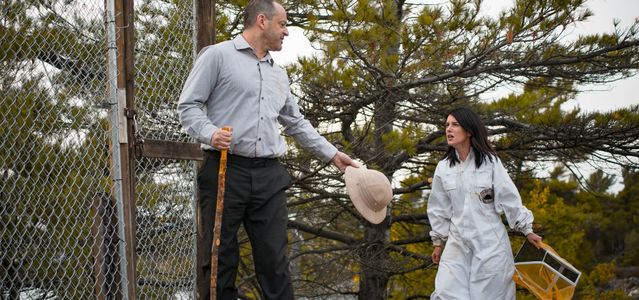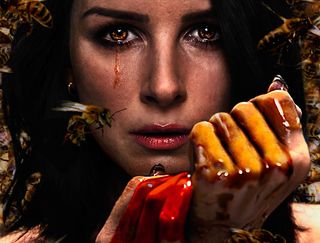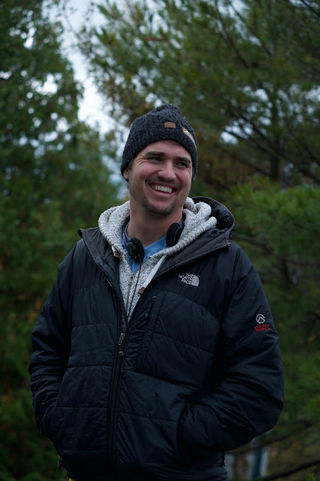Openness
Exclusive Interview With Writer-Director of Blood Honey
Get a behind-the-scenes peek at this new psychological thriller.
Posted January 17, 2018

As both a psychologist and a fiction author, I was super excited to land an interview with award-winning filmmaker Jeff Kopas, the writer/director behind the new Hitchcockian thriller Blood Honey.
Blood Honey stars Shenae Grimes-Beech (Degrassi: The Next Generation) as the female lead and Gil Bellows (Shawshank Redemption, 11.22.63) as her antagonistic father. The film has already opened in Canada and will be released in the U.S. on DVD and VOD on January 29 (click here to learn more about the film).
Before we dive into the interview, here is a quick synopsis of the film [or view the trailer]:

“Summoned by her dying father, Jenibel Heath, after a decade away, reluctantly returns to her beautiful island home, a remote fly-in hunting and fishing lodge. Waiting for her is bitter family dysfunction and the nightmare of her last childhood memory: the suicide of her mother. Soon, Jenibal finds herself burdened with selling off the family lodge, against the wishes of her family and friends. In a harrowing passage through guilt, loyalty, and devastating memories, Jenibel navigates an obstacle course of personal torment that pushes her psyche to the breaking point. What begins as a journey of forgiveness, devolves into a fatal nightmare and a struggle to maintain not just her sanity, but her life.”
INTERVIEW:
Melissa Burkley: In my blog “The Writer’s Laboratory” I offer advice to writers on how to incorporate psychological principles and research into their fiction writing to make it more authentic. One of the topics I’ve explored in my blog is where writers get their ideas. So I’ll pose the question to you: Where do you find your script ideas?

Jeff Kopas: In general, the ideas come from a desire to say something of meaning. Ideally, they come from a place where you have something to say that’s not being said.
The battle is that you go through the years of development and production and editing, and have to hold on to and remember what that core message is you are meaning to express.
MB: And where did your idea for Blood Honey come from?
JK: It started location-based, which is weird and, I’ve learned, also dangerous [he laughs]. My parents have a summer cottage in eastern Canada on the lake. There was an old hotel there from 1901 that was turned into a community club. There have been murders there, a suicide; it’s just incredibly haunted. I worked there growing up and starting as a kid, I always wanted to shoot a psychological thriller there. That’s actually how this script got started.
But [after a few years working on the script] I got into this place where I’d started with location and hadn’t started with this idea of wanting to say something. I found myself with a story that didn’t work. It didn’t say anything. So our producer convinced me to bring on another writer to take a fresh stab at it because I was just going in circles, which happens and is really dangerous. So that’s when I convinced Doug Taylor to come on and co-write with me. Together we maintained the basic theme of a “woman in peril” story. And my goal had always been to tell an old-school psychological thriller that could really happen. That was really important to me.
MB: So you say you want to write stories that have a meaningful message. What is the message you wanted to get across with Blood Honey?
JK: I strongly believe you can’t be happy as an adult unless you resolve the sins or trauma of your childhood. Blood Honey is an extreme scenario, but that is the idea behind it. Everyone has issues from their childhood, to varying degrees, and it is impossible to be at peace as an adult if those aren’t resolved. I think that is a universal theme that everyone can relate to.
MB: On the one hand as a writer, you have to give the audience what they want and meet their expectations. But on the other hand, you have to make sure not to fall prey to overused tropes. How do you ride that fine line?
JK: Tropes to some degree sell. People want them in certain types of movies, especially genre movies. But ultimately, tropes are lazy. So I think how you get away from that is to be authentic. With Blood Honey, we had a desire to make it a logic-based film. We wanted to make sure things could only happen if they were believable. If it is authentic storytelling, then hopefully you avoid falling prey to the tropes. But it is hard.
MB: Blood Honey is chock-full of psychological themes such as trauma, suicide, mental illness, repressed memories. Did you do research on these psychological concepts during the writing process?
JK: Yes, one hundred percent! I had a couple of psychologists here in Toronto that I kept showing the script to as we were writing it, to make sure we were in the realm of believability. And to my amazement, they kept coming back with case studies to back up the events occurring within Blood Honey.
MB: Interesting. I wasn’t sure if most psychological thriller writers/directors consult psychologists, but it seems that they should. Especially since there are so many misconceptions and stereotypes out there about mental illness.
JK: Ultimately, our main goal was to make an authentic psychological thriller so that’s why we did it. To be able to send your script to someone who works in psychology is so cool because they come back with the best notes. That’s regardless of whether or not it is a psychological thriller, just from a character-based point of view. I told them that [beyond the psychological themes], I just wanted their notes about whether the characters’ behaviors were believable.
MB: I think that’s a good point. Psychologists are really good at many aspects of storytelling—things like character development, authentic dialogue, and non-verbal mannerism. It’s a skill that we develop so much that it’s a habit and we don’t even realize we are doing it. Because of our training, we pay so much attention to what people say and how they respond. I definitely use that aspect of my training when writing my own fiction, but for people who haven’t had psychological training, it just may not come naturally. So it makes sense to seek out a psychologist’s opinion as a consultant.
JK: I agree. Psychologists are an awesome resource and it is something I will continue to do for sure.
MB: We’ve been talking about your role as a writer but let’s switch gears now and talk a bit about your role as director. The bee scene. I feel like you can’t talk about this movie without talking about the bee scene. It definitely was intense watching it unfold on the screen and I can’t imagine what it was like to be there in person. Can you tell me a bit about how you convinced your actor, Gil Bellows, to do that scene?
JK: Yeah, not easily [he laughs]. I flew from Toronto to Montreal to meet Gil for lunch because he was shooting an Amazon series there. We’re sitting there eating oysters and we get to the bee scene. Before I even ask, he says, “I’ll do it…if you do it first.” So I say, “Yeah, let’s do this.” Then he said, “Okay, just promise me I’m not gonna die.” But I got lucky because Gil is pretty close to being a method actor, so he’s pretty intense on set. When the time came [to film the bee scene], he was just game for it.
So there we were, filming on this isolated island twenty minutes from the mainland and we literally boated in these two beehives. Each hive has about 60,000 bees in it. It was a pretty cool experience.
MB: Were there any mental preparations that you saw Gil take before doing the scene, to get himself in the right mindset?
JK: Yeah, he definitely went into [a] Zen state. He does a lot of meditation and went into a meditative state just before shooting the scene. Having bees on you like that is a pretty weird feeling. You can feel their little tongues licking your sweat.
MB: So it sounds like you did try it out yourself?
JK: Yeah, I had a few. Not even close to what he did, though.
MB: Throughout the film, there are times when the viewer doesn’t know whether what they are seeing is real or a memory or a hallucination. As a result, it fits into a recent trend in fiction and film known as the “unreliable narrator,” like Gone Girl and Girl on a Train. I was curious about your opinion. Why do you think modern audiences are so drawn to unreliable narrator stories?
JK: That’s a really good question. I think that maybe it’s because storytelling has continued to evolve. We broke this fourth wall in the last few years in a mainstream way, and I wonder if people are less upset by being tricked by a narrator now. I wonder if an audience would handle it the same way thirty years ago as they do now. So many of these stories with unreliable narrators, like House of Cards, have the narrators breaking the fourth wall and talking directly to the audience. And you know that maybe they’re not being completely honest with you, but that’s in part because they are lying to themselves. So I wonder if that’s opened up a window for writers to do that.
The unreliable narrator is certainly not new, I just think, as you said, there is a recent trend. I also think it is just storytellers trying to find a unique way to tell their stories. This is a tool that is more readily available now.
MB: So what are you working on now?
JK: I’ve got a lot of scripted television now, which is really fun. I’ve got an ABC series that I developed with Alicia Key’s production company that hopefully will go into production this summer, based on the Freedom Riders. I’ve actually got nine different scripted TV series in varying degrees of development right now.
And I have one feature film left. It is a sexual psychological thriller based in Venice, Italy, during Carnivale.
MB: So when you write your scripts, do you write them sequentially or do you have to bounce back and forth between different projects?
JK: Every writer figures out their own best method. I’m really top-heavy down so I have a really good idea of what I’m going to write when I actually get down to doing the first draft. I spend a lot of time in development. I spend a lot of time on outlines and beat sheets and story maps and character biographies. I even create character psychologies now. So by the time I get to the first draft, I’ve got a really good idea of what I’m going to be doing and I try to kick it out quite quickly. I’ll write that first draft in one or two goes. And then obviously, you spend years rewriting the thing [he laughs].
How about you, what do you do?
MB: I do things very similarly. I talked about this in an earlier blog post, but it seems to me that there are two types of writers. There are writers that do almost all of their writing beforehand and then when they get to actually putting it down on paper, the story just spills out. I’m definitely one of those types. I spend months (or years) thinking about it during the day or when I’m falling asleep. So when it comes down to actually doing the writing, it just seems to pour out and happens pretty quickly.
But certainly, there is another style of writer that sits at the blank page or screen and writes in their mind while they are writing the physical words down. So it’s interesting to look at those two different styles.
JK: Yeah, I find that most of the accomplished writers I talk to working in novel or screenplay formats seem to be pretty top-heavy. The ones I find really interesting are the ones who are so disciplined. They have to write every day. They force themselves to be at the computer every day at nine a.m. and work until four. I think a lot of novelists do that, which I think is really interesting. But I find that a lot of them are still top-heavy. They have a pretty good map before they go on to write and I think the reason is that it saves you years of redrafts.
I think it is a bit of an amateur thing to just sit down and start writing too early. Because it takes self-discipline not to. It’s really hard for me to sit there knowing I should just wait, get feedback on it, talk to people about it before I dig in. Because once you get into that first draft, it’s so much harder to change.
MB: So those are my main questions. I have one little fun question I try to end all my interviews with. It’s a mini personality quiz [the five-item NEO-PI for those familiar with personality psychology]. For each pair of descriptions below, just pick the one that you feel best describes or represents you
JK: [Jeff’s responses are in italics]
• Enthusiastic or Reserved?
• Critical or Sympathetic?
• Self-disciplined or Disorganized?
• Anxious or Calm?
• Conventional or Creative?
Note: Jeff’s responses suggest he is high in extroversion, conscientiousness, and openness to experience and low in agreeableness and neuroticism. My guess is a lot of successful film directors have similar personality profiles.
Want to take the personality test yourself? Circle the word in the choice-pairs above that best describes you and then score as follows:
• Enthusiastic = High Extroversion; Reserved = Low Extroversion
• Critical = Low Agreeableness; Sympathetic = High Agreeableness
• Self-disciplined = High Conscientiousness; Disorganized = Low Conscientiousness
• Anxious = High Neuroticism; Calm = Low Neuroticism
• Conventional = Low Openness to Experience; Creative = Openness to Experience
See here to learn more about each of these personality traits.




